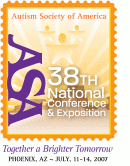 |
The ASA's 38th National Conference on Autism Spectrum Disorders (July 11-14, 2007) of ASAThe Westin Kierland Resort & Spa, Scottsdale, AZ |
| For a complete author index with session numbers, please click here | |
| Thursday, July 12, 2007: 3:00 PM-4:15 PM | |||
| Rainmakers Ballroom A | |||
| #2566- My Brother's Keeper: Being Responsible for a Sibling with Autism* | |||
| Many brothers or sisters will have some level of responsibility for their sibling with autism particularly after our parents are no longer able to care for them. This session will focus on the good and the not-so-good emotions that come with this new job as well as suggestions for ways to make the transition easier, resources and answers to some of the questions that keep us up at night, and strategies to make the prospect of this job less daunting. | |||
| Presenter: | - Kristen Rogers Fairburn recently wrote a book entitled "My Brother's Keeper: Being Responsible for a Sibling with Autism" and is the Director of Policy and Practice for the Washington Council for Prevention of Child Abuse and Neglect. Kristen has a degree in Psychology from Mount Holyoke College and a Masters of Social Work from the University of Washington. She lives in Fircrest, Washington with her husband Karl, a few minutes away from her younger brother Phillip who has autism. | ||
|
| |||
|
Siblings play an important role in each others lives, particularly if one of them has autism. This presentation will focus on siblings of people with autism who are going to be responsible for their brother or sister someday. It will address the realization of that fact, and the emotions related to that role the guilt, the joy, the anger, the frustration, the sadness. There are feelings that go along with being the typical sibling that never get talked about, and are rarely acknowledged even by the person experiencing them. It isn't possible to take care of another person adequately if you never acknowledge how that responsibility makes you feel the good and the bad. It is ok to have feelings about that role and about that sibling and caretakers need to know that recognizing those emotions is important. In many families the fact that one or more sibling might take on care for a brother or sister with autism is not discussed even well into adulthood. Sometimes it is assumed that this role is a given, or is inevitable, sometimes there is a hope that it will not need to be taken on by one of the siblings, but whatever the reason the topic just doesn't seem to come up. However, this is a big job, and one that needs to be carefully considered to ensure that both the sibling who will be the caretaker (in whatever form that takes) and the sibling with autism are prepared. Do you want to be responsible for your sibling? Is your spouse or significant other on board with your decision to take on that responsibility? How do you bring up this topic with your parents? What are the important issues to consider when talking about becoming someone's caregiver? How will you ensure that you brother or sister is financially taken care of? What can you do now to prepare for that role? What can your parents do to ensure that the transition is as easy as possible for you and your sibling? These are just some of the questions that come up when you start thinking about your role as caretaker. The presenter will walk through each of these questions and others and provide strategies, resources and her own personal experiences dealing with this new role. Aside from the questions, there are some specific aspects about your brother or sister's life to think about now in order to be prepared down the line. Housing is probably one of the biggest issues to consider. Where your sibling will live, whether it be with you, in a group home, on his or her own, or in government housing is something to start thinking about early, because it may require planning. There may be waiting lists to sign up for, or skills your sibling will need to learn, or preparations you will need to make, either physically to your home or emotionally, in order to be ready. Another issue to consider is finances. Are you going to be responsible for your siblings spending? What about their long term finances like a special needs trust, government benefits or other resources they may have? The presenter will provide some important first steps you can take to understand all of the financial issues that might impact your sibling, and offer you resources that you can refer to as particular issues arise in your situation. Other issues to be discussed include employment, sexual activity, social interactions and transitions. Last but not least, it is important not to lose yourself in the role of caretaker. You have your own life, and you are entitled to live it! The presenter will provide some suggestions for how to check how balanced your life is between your own needs and those of your sibling, as well as ideas for how to take care of yourself and some of the things she does to ensure that she doesn't get lost in caring for others. The goal of this session is for siblings who may someday take on the role of caretaker to be aware of what is ahead of them and to have some tools to help them manage that responsibility successfully. |
|||
See more of General Submissions
See more of The ASA's 38th National Conference on Autism Spectrum Disorders (July 11-14, 2007)